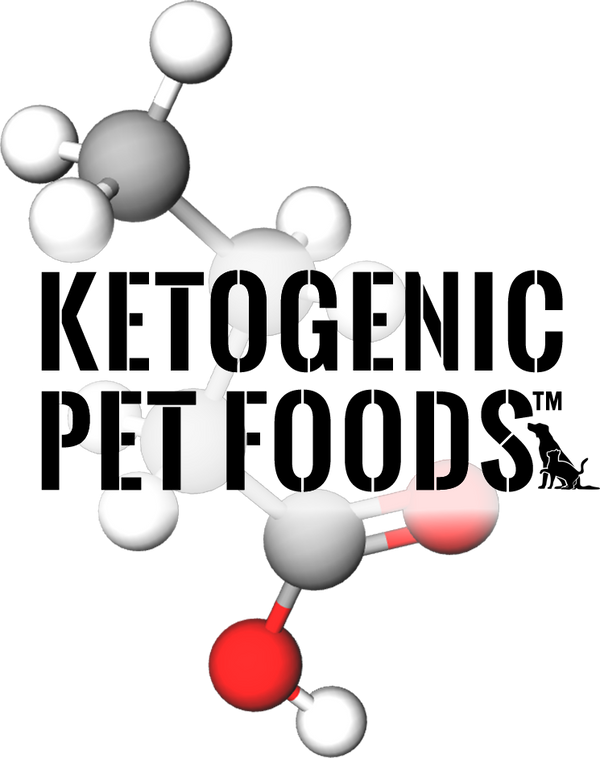What is a Ketogenic Pet Diet?

In basic terms, a Ketogenic Pet Diet is predominant in protein and fat, and low carbohydrate. This natural diet encourages the burning of fats for fuel.
Given the ubiquity of carbohydrate-based foods in our modern society (for pets and people), think of a Ketogenic Diet as a fundamental departure from and avoidance of our society’s food norms: Bread, Pasta, Pizza, Candy, Pop, Chips, Donuts, Bagels, Potatoes, French Fries, Rice, Alcohol, etc.
This standard American fare and the commercial pet foods that follow suit promote a carbohydrate-based energy system. The body adapts to the consistent carbohydrate intake, and identifies carbohydrates as its primary source of energy.
But because carbohydrate intake most often exceeds energy expenditure, the “leftover” carbohydrates convert directly to adipose tissue (fat). Moreover, the sugars metabolized from carbohydrates are like a dirty fuel to mitochondria resulting in an exhaust of a toxic stream of free radicals that injure tissue, impair immune function, and shorten healthspan.
More than 1/3 of adults in the USA are obese. According to PetObesityPrevention.org, a startling 52.7% of U.S. dogs and 57.9% of U.S. cats are overweight or obese. Excess carbohydrates are the fundamental source of this health disaster.
The carbohydrate trend in pet foods is particularly harmful because pets are fundamentally carnivores. Because of their more tame demeanor, the tendency is to think of “Fido” and “Fluffy” as a species apart from their wild counterparts. Behaviorally that may be so, but genetically it’s not. Domestic dogs and cats are genetically indistinguishable from their wild counterparts.
Given the ubiquity of carbohydrate-based foods in our modern society (for pets and people), think of a Ketogenic Diet as a fundamental departure from and avoidance of our society’s food norms: Bread, Pasta, Pizza, Candy, Pop, Chips, Donuts, Bagels, Potatoes, French Fries, Rice, Alcohol, etc.
This standard American fare and the commercial pet foods that follow suit promote a carbohydrate-based energy system. The body adapts to the consistent carbohydrate intake, and identifies carbohydrates as its primary source of energy.
But because carbohydrate intake most often exceeds energy expenditure, the “leftover” carbohydrates convert directly to adipose tissue (fat). Moreover, the sugars metabolized from carbohydrates are like a dirty fuel to mitochondria resulting in an exhaust of a toxic stream of free radicals that injure tissue, impair immune function, and shorten healthspan.
More than 1/3 of adults in the USA are obese. According to PetObesityPrevention.org, a startling 52.7% of U.S. dogs and 57.9% of U.S. cats are overweight or obese. Excess carbohydrates are the fundamental source of this health disaster.
The carbohydrate trend in pet foods is particularly harmful because pets are fundamentally carnivores. Because of their more tame demeanor, the tendency is to think of “Fido” and “Fluffy” as a species apart from their wild counterparts. Behaviorally that may be so, but genetically it’s not. Domestic dogs and cats are genetically indistinguishable from their wild counterparts.

The good news is that pets are adaptive to their food just as humans are. Reduce or eliminate the unnatural carbohydrate content, introduce Ketogenic dietary principles, and their system can shift to burning fat for energy instead of carbohydrates.
The science behind Ketogenic Diets is overwhelming and undeniable. Ketogenic diets have been recognized in clinical and scientific literature for*:
- Promoting weight loss
- Increasing energy and vitality
- Effective treatment of seizures
- Increasing healthy cholesterol levels and blood pressure improvement
- Improving skin health and correcting skin conditions
- Optimization of insulin levels
- Improvement of most other health parameters
(Note that although the ketogenic diets for humans consist of high fat, moderate protein, and small amounts of carbohydrates, humans are not carnivores. An appropriate ketogenic diet for carnivores [dogs and cats] is similarly high fat and low carbohydrate, but also includes higher protein levels than advisable for human ketogenesis.)
The science behind Ketogenic Diets is overwhelming and undeniable. Ketogenic diets have been recognized in clinical and scientific literature for*:
- Promoting weight loss
- Increasing energy and vitality
- Effective treatment of seizures
- Increasing healthy cholesterol levels and blood pressure improvement
- Improving skin health and correcting skin conditions
- Optimization of insulin levels
- Improvement of most other health parameters
(Note that although the ketogenic diets for humans consist of high fat, moderate protein, and small amounts of carbohydrates, humans are not carnivores. An appropriate ketogenic diet for carnivores [dogs and cats] is similarly high fat and low carbohydrate, but also includes higher protein levels than advisable for human ketogenesis.)



